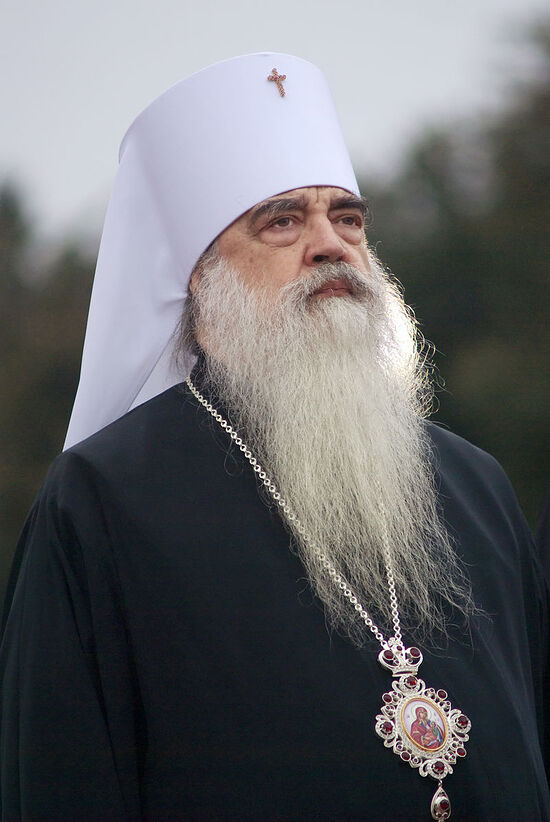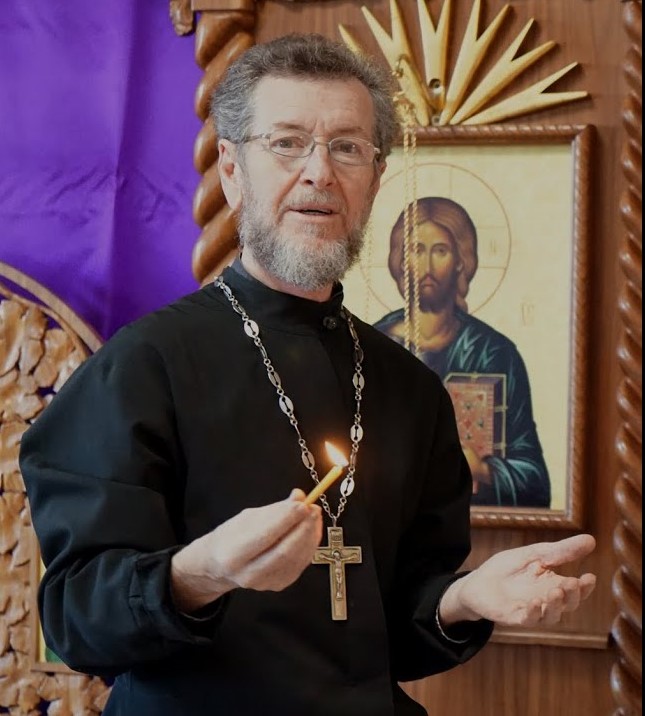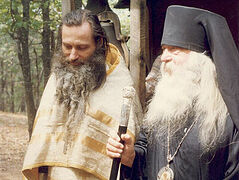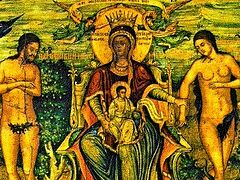Today we spoke with Archpriest Eugene Grushetsky, rector of the Church of St. John of Kronstadt in San Diego, California, a biologist and Master of Theological Studies.
This could only happen in the USSR
Dear Mikhail and Olga, you ask me to tell you about the Providence of God in my life and how it led me to my priestly ministry. I will be happy to share the memories of my childhood and youth with you.
I was born in 1949 and grew up in the 1950s. At that time, Nikita Khrushchev was eager to show the country the last priest and was determined to destroy the Russian Orthodox Church completely. In the late 1950s and early 1960s the number of churches in the USSR was nearly halved, and five theological seminaries were closed—it was another wave of persecution.
I was raised in an ordinary non-religious family. It was a typical Soviet family, so we hardly ever talked about God or the Church. We weren’t atheists either; rather, we were critical of atheism. The fact that a young man from such an ordinary Soviet family converted to God was undoubtedly an act of Divine Providence.
My father worked as a geologist and my mother always travelled with him. They were constantly searching for some fossils. The story of how they first met was interesting (this could only happen in the USSR): my father studied to be a geologist in Kiev and then was sent to work in Kamchatka. My mother was born in Chechnya, but she wasn’t a Chechen—she came from an old Cossack family. Her parents were oil industry workers; they worked in Sakhalin, then together with their daughter they came to Kamchatka, and at that time my father was investigating the earth’s depths there.
My mother worked at a library there. One day my father, a bookworm, came there and saw my young mother. And that was it... They became a happy family with three sons. I, their firstborn, was born in the village of geologists in Kamchatka, near the Klyuchevskaya Sopka stratovolcano.
 The Klyuchevskaya Sopka volcano on Kamchatka
The Klyuchevskaya Sopka volcano on Kamchatka
I really wanted to find out how life arose on Earth
Since my father didn’t find anything special in Kamchatka, we moved to Minsk where I graduated from high school. From childhood I was interested in the eternal questions of existence. I wanted to know how life originated on Earth, how animals, birds, and humans appeared. My father encouraged me, bringing me various stones and rock samples from his expeditions, and I enjoyed scrutinizing them and thinking about the creation of the world. My father and I loved to go to a second-hand bookstore to buy books for our family library.
So, no one in my family was surprised when I decided to study at the Biology Department of Belarusian State University. When we were studying philosophy there, I learned that there were such Russian philosophers as Vladimir Soloviov and Nicolai Berdyayev. I was happy that there were not only Lenin, Marx and Engels. In 1971, I graduated from the university, and my father defended his Ph.D thesis at the Institute of Geology.
If everything is left to change, nothing will ever work out
Since I had always been interested in the problem of the creation of the world and the origin of life on Earth, I finally discovered theology. As a biologist I realized that natural selection is not the kind of mechanism that can explain the diversity of species. All the biodiversity couldn’t have developed by itself. If everything is left to chance, nothing will ever work out. Charles Darwin used to say:
“There is no direction, no vector. Everything is a product of chance; it’s random selection.”
When asked, “Why are there no transitional species?”, he would reply, “They must exist, but they haven’t been found yet. Just keep searching.”
The concept of a species was controversial too: what is a species? Darwin spoke about modifications. However, he himself realized the weakness of his statements because sparrows are sparrows, pigeons are pigeons, and foxes are foxes. But there are minor modifications. So Darwin believed that when these modifications accumulate, new species appear. True, this may happen on an island was separated from the mainland long ago. Modifications may appear there—for example, the dingo in Australia. But it’s still a dog!
Darwin tried to demonstrate this on pigeons: “Look at how different pigeons are! How different are the dogs—from huge Great Danes to tiny Chihuahuas!” Yes, they are different, but they are all pigeons and dogs! These are not different species!
Then Darwin said that a new species could appear in a million years. But his statement was an intellectual exercise, a mere extrapolation and guesswork. In his youth he studied theology at Cambridge to become a clergyman; and he certainly read the Bible, which correctly describes the creation of the world in the right order: light, plants, fish, birds, mammals and man. The prophet Moses described all this in in the book of Genesis around the thirteenth century B.C., and thirty-two centuries before Darwin! So Darwin learned all this in the Bible—and then began to explain that everything had evolved by itself.
 Evolution with a sense of humor
Evolution with a sense of humor
But, despite countless theories, scientists still cannot understand how life arose, how organic molecules created the first living cell. I understood that science couldn’t explain this and turned to the biblical view of the creation of the world.
In the USSR, we were told that the most important things in our history began after the Revolution, while all previous events were prehistory, the preparation for the “great” Revolution. But I saw that the real values had existed before the Revolution; though the branches were cut off, the roots remained, and the Orthodox Church preserves these roots through the Tradition, the saints and faith.
The only place where I could do what I wanted was the theological academy
I started working at the Institute of Genetics and Cytology of the Academy of Sciences in Minsk, where I met someone who afterwards guided me in life. She realized how much I was interested in philosophical and theological questions relating to the creation of the world, and told me about the family of Protopresbyter Vitaly Borovoy (1916–2008).
Fr. Vitary was a famous priest from Moscow, and his son lived with his family in Minsk, and that lady knew their family. She said that Fr. Vitaly taught in Leningrad where there was a theological seminary and an academy. I had no idea about that!
When I heard about the academy and that it was possible to study philosophy and the history of the creation of the world not from the point of view of Marx, Engels and Darwin, I got enthusiastic about the idea of studying there. I was told: “You can study at the Department of Philosophy of a Moscow or Leningrad university.” But I knew that they were engaged in Marxism-Leninism or critical philosophy... The only place where I could do what I wanted was the theological academy. But the way to it was through the seminary.
 The Leningrad Theological Academy in the 1980s
The Leningrad Theological Academy in the 1980s
I want to study theology!
I traveled to the address, 17 Obvodny Canal—the address of the theological seminary. It was in the summer, so there was no one inside except an old woman in the cloak room. I sat down to talk to her. Suddenly the door opened and a man entered. The old woman rushed to him reverently:
“Bless, father!”
I didn’t know how to ask for a priest’s blessing. I just came up and said,
“Hello!”
And it was the then rector, Archimandrite Kirill, the current Patriarch of Moscow and All Russia. He asked me:
“Who are you? Why are you here?”
“I’m from Minsk, and I’m thinking of entering the seminary!”
“Why are you sitting in the cloak room? Come with me.”
We talked in his reception room, he asked me about my plans, and I said proudly:
“I want to study theology!”
“Theology is good, but the Church needs priests.”
I remembered that. He added:
“Go and get a list of the documents required for admission.”
As I was going downstairs, someone pointed to a man and said to me:
“Here is a man with a higher education.”
I went up and met Dmitry Ivliev, the future Archimandrite Iannuary (1943—2017), a wonderful pastor, theologian, Biblical exegete and Professor of the St. Petersburg Theological Academy. He told me:
“It is possible to enter the seminary with a higher education, but it is very hard as the authorities will throw obstacles in your way. You are from Belarus, the most atheistic republic. You need to resign from the Institute of Genetics and get some simple job. For admission to the seminary take a letter of recommendation from your parish priest.”
 Archimandrite Iannuary (Ivliev)
Archimandrite Iannuary (Ivliev)
My first spiritual guide
I returned to Minsk and entered the huge Holy Spirit Cathedral for the first time. I found a priest and asked him to give me a letter of recommendation for entering the seminary. He was frightened—in those days a priest could be suspended for such a document. He told me:
“Only our Metropolitan can give you this letter of recommendation. Go to him!”
Then a lively deacon, Fr. Leonid, came up to me and said in a whisper, playing a trick on me:
“Follow me—you’ve already been spotted!”
We went outside and he said:
“Take such and such a trolleybus, get off at such and such a stop, and proceed to Metropolitan Anthony’s office.”
I heeded his advice. Metropolitan Anthony (Melnikov; 1924–1986) of Minsk and Belarus received me, gave me a letter of recommendation and became my first spiritual mentor. Vladyka was a highly educated and intelligent person. We met with him once every two weeks, and he allowed me to call him if I had questions.
He published the excellent Theological Works magazine. They published Vladimir Lossky's Mystical Theology of the Eastern Church, Confessions by Blessed Augustine and many other wonderful works that had not yet been published in the USSR. Unfortunately, few people knew about that magazine since such information was then hushed up.
Vladyka advised me to read, The Spiritual Life and How to be Attuned to It, by St. Theophan the Recluse and other spiritual works. He gave me books from his own excellent library—in those days it was impossible to get any Patristic literature. I was given an old thick Bible by my relatives—I just couldn't find it myself.
 Archbishop Anthony (Melnikov) of Minsk and Belarus
Archbishop Anthony (Melnikov) of Minsk and Belarus
Ordination
Thank God I entered the seminary. I studied for a year and then approached Vladyka Kirill (now His Holiness Patriarch Kirill):
“Vladyka, after university it is hard for me to study at the seminary.”
He met me halfway and allowed me to study at the academy right after the first year at the seminary on condition that I passed all the exams for the seminary course simultaneously. That’s exactly what I did.
At the academy I understood the words of Vladyka Kirill that the only logical path after graduation was the priesthood. I graduated from the academy in 1981 with a Ph.D in Theology and applied for ordination. By that time my first spiritual father, Vladyka Anthony (Melnikov), had become Metropolitan of Leningrad and Novgorod, and he ordained me in 1983 at the St. Nicholas Naval Cathedral in Leningrad.
 Fr. Eugene with Metropolitan Anthony
Fr. Eugene with Metropolitan Anthony
For a month I served in the cathedral, and then I found my second spiritual mentor—Archbishop Meliton of Tikhvin (Soloviev; 1897–1986), a blessed elder and man of prayer. I came to the cathedral, and he taught me how to serve, to move reverently, unhurriedly and beautifully in the altar. For a year my wife and I lived in Leningrad where I taught Church history at the academy. But we had nowhere to live and decided to return to Belarus.
How Metropolitan Philaret went to the Government House in full episcopal vestments
In Belarus I served first in Borisov, and from 1985 in the Holy Spirit Cathedral in Minsk. Vladyka Philaret (Vakhromeev; 1935—2021) served as the Metropolitan of Minsk and Belarus in those years. He came from an old Yaroslavl family of merchants and industrialists who left a deep mark in the history, economy and culture of Yaroslavl, and were awarded titles of nobility for services to the Fatherland. Metropolitan Philaret was a remarkable archpastor, who combined deep faith, culture, wisdom, intelligence and the gift of discernment.
 The little Vakhromeevs. Bartholomew, the father of the future metropolitan, is the third from the right
The little Vakhromeevs. Bartholomew, the father of the future metropolitan, is the third from the right
Betwee 1973 and 1978, Vladyka Philaret had been Archbishop of Berlin and Central Europe, the Patriarchal Exarch of Central Europe. So he came to Minsk from Germany; and Belarus was then the most atheistic republic. When I began to serve at the cathedral, the Commissioner for Religious Affairs summoned me to his office and began to threaten me—in those years serving at God’s altar and confessing your faith was very dangerous.
Whenever Metropolitan Anthony was summoned to the BSSR Commissioner for Religious Affairs at the Government House (“Dom Urada”) in Minsk, he had to change into a secular suit. But Metropolitan Philaret would go to the Government House in full bishop’s vestments—an imposing man with a cross and a panagia. All the officials ran out of their rooms: “Who is he and how dare he appear in these robes in our citadel of atheism and communism?!” And he said:
“I have no other clothes!”
He usually spoke slowly, wisely, weighing every word he said. The officials were at a loss; they could say nothing against Vladyka’s arguments. He was head and shoulders above them, and possessed the gift of discernment. “Since a bishop in full vestments dared to show up at the Government House, we’re done for,” they thought.
Later Vladyka didn’t go to the Commissioner anymore—the Commissioner himself would come to him. The officials decided that it would be better than seeing the Metropolitan in his bishop's vestments walk around the corridors of their citadel!
After that the Church in Belarus gradually became highly influential: the seminary in Zhirovichi, which had been closed under Khrushchev, was restored, the number of dioceses increased from one to eight (now there are fifteen of them), and at present the Church of Belarus has its own Synod. For ten years I was under the omophorion of Metropolitan Philaret. For Belarus he was a gift from above. The once-atheistic republic turned into a flourishing Orthodox country.
 Metropolitan Philaret (Vakhromeev) in his youth
Metropolitan Philaret (Vakhromeev) in his youth
 Metropolitan Philaret (Vakhromeev) of Minsk and Slutsk, Patriarchal Exarch of All Belarus
Metropolitan Philaret (Vakhromeev) of Minsk and Slutsk, Patriarchal Exarch of All Belarus
God’s providence brought me to ROCOR
God’s providence brought me to ROCOR, and my wife and daughter Xenia and I went to the U.S.
Between 1995 and 2011, I served at the Church of St. Panteleimon in Minneapolis, Minnesota, and for ten years now I have served at the Church of St. John of Kronstadt in San Diego.
 The Church of St. John of Kronstadt in San Diego
The Church of St. John of Kronstadt in San Diego
 In the church of St. John of Kronstadt
In the church of St. John of Kronstadt
Our parish was opened in 1967, and St. John of Kronstadt had been canonized by ROCOR in 1964 (by the Moscow Patriarchate in 1990), so our church became one of the first churches in the world to bear his name.
 Archpriest Eugene Grushetsky with parishioners
Archpriest Eugene Grushetsky with parishioners









